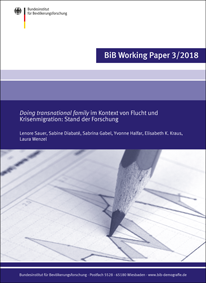Miscellaneous PublicationsDoing transnational family im Kontext von Flucht und Krisenmigration. Stand der Forschung
Sauer, Lenore; Diabaté, Sabine; Gabel, Sabrina; Halfar, Yvonne; Kraus, Elisabeth K.; Wenzel, Laura (2018)
BiB Working Paper 3/2018. Wiesbaden: Bundesinstitut für Bevölkerungsforschung

URN: nbn:de:bib-wp-2018-032
In the last years, the number of forcibly displaced people worldwide has constantly increased. According to UNHCR, the number of individuals fleeing to more distant countries has also risen substantially. In Germany, almost 1.4 million asylum applications were filed between 2015 and 2017, mainly by people from Syria, Afghanistan, Iraq and Eritrea. Due to these latest developments, a separate research area on forced migration and refugees in Germany has recently been established. However, in Germany, most studies—across different disciplines—deal with issues of integration and participation. Up to now, there are only very few studies focusing on families of refugees, although it is clear that families play a crucial role both for the decision to migrate and for integration and participation in the country of destination.
This working paper has been written in preparation for an empirical study which aims to close this research gap. It summarizes international literature on the different aspects of the formation, maintenance and change of transnational families as well as transnational everyday practices and support. It also deals with the consequences of transnationalism on the relationship stability and quality between spouses, children and parents as well as their (subjective) well-being, attitudes and gender roles. In addition, this working paper attempts to establish a link between the current literature on transnational families and the context of forced migration and to identify relevant research gaps in the field of transnational families and flight.








